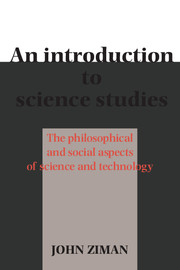Book contents
- Frontmatter
- Contents
- Preface
- 1 ‘Academic’ science
- 2 Research
- 3 Validity
- 4 Communication
- 5 Authority
- 6 Rules and norms
- 7 Change
- 8 The sociology of scientific knowledge
- 9 Science and technology
- 10 Pure and applied science
- 11 Collectivized science
- 12 R & D organizations
- 13 The economics of research
- 14 Science and the State
- 15 The scientist in society
- 16 Science as a cultural resource
- Index
- Frontmatter
- Contents
- Preface
- 1 ‘Academic’ science
- 2 Research
- 3 Validity
- 4 Communication
- 5 Authority
- 6 Rules and norms
- 7 Change
- 8 The sociology of scientific knowledge
- 9 Science and technology
- 10 Pure and applied science
- 11 Collectivized science
- 12 R & D organizations
- 13 The economics of research
- 14 Science and the State
- 15 The scientist in society
- 16 Science as a cultural resource
- Index
Summary
‘Such…is the respect paid to science that the most absurd opinions may become current, provided they are expressed in language, the sound of which recalls some well-known scientific phrase.’
James Clerk MaxwellDifferent aspects of science
What is ‘Science’? Our whole approach to the subject of this book depends on how we might be tempted to answer this question. But it is really much too grand a question to be answered in a few words. Conventional definitions of science tend to emphasize quite different features, depending upon the point of view. Each of the metascientific disciplines – the history of science, the philosophy of science, the sociology of science, the psychology of creativity, the economics of research, and so on – seems to concentrate upon a different aspect of the subject, often with quite different policy implications.
For example, if science is defined as ‘a means of solving problems’, this emphasizes its instrumental aspect. Science is thus viewed as closely connected with technology, and hence an appropriate subject for economic and political study. The implication that this instrument should be used wisely and well puts it into the open arena of social conflict.
Another definition of science – as ‘organized knowledge’ – emphasizes its archival aspect. Information about natural phenomena is acquired by research, organized into coherent theoretical schemes, and published in books and journals.
- Type
- Chapter
- Information
- An Introduction to Science StudiesThe Philosophical and Social Aspects of Science and Technology, pp. 1 - 12Publisher: Cambridge University PressPrint publication year: 1984



